|
|
|
Sort Order |
|
|
|
Items / Page
|
|
|
|
|
|
|
| Srl | Item |
| 1 |
ID:
132343
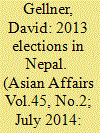

|
|
|
|
|
| Publication |
2014.
|
| Summary/Abstract |
In spite of all the difficulties, the November 2013 elections in Nepal passed off for the most part peacefully and with fewer irregularities than ever before in Nepal. The electoral system was the same as the system used in 2008, with a combination of First Past the Post and Proportional Representation. The results were a defeat for the Maoists, who went from being the biggest single party to the third biggest party. The victors were the two older established parties, the Nepali Congress and the Unified Marxist-Leninists, who seem to have benefitted from the voters dissatisfaction with the Maoists' showing in government. The second big losers in the election were the parties who favoured an ethnic-based solution to Nepal's problems, though the relationship between the Madheshis and the centre remains an unsolved problem.
|
|
|
|
|
|
|
|
|
|
|
|
|
|
|
|
| 2 |
ID:
132344
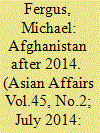

|
|
|
|
|
| Publication |
2014.
|
| Summary/Abstract |
A number of the NGOs now working in Afghanistan, like Oxfam, Afghan Aid and the Agha Khan Foundation have been there for many years and show no sign of planning to leave when NATO troops withdraw. This article is written by a committee member of the Norwegian Afghanistan Committee, which was formally established in Bergen in 1980, as a political reaction to the Soviet invasion. In 1983, the Committee started sending health workers into unoccupied areas of the country and their activities have continued ever since, though the Soviets left nearly a quarter of a century ago. The goodwill and contacts built up over time by the Committee and other NGOs have been important in validating their presence, their activities and their motives. To be useful in Afghanistan needs a commitment to the long haul.
|
|
|
|
|
|
|
|
|
|
|
|
|
|
|
|
| 3 |
ID:
132342
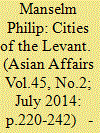

|
|
|
|
|
| Publication |
2014.
|
| Summary/Abstract |
Global cities are almost by definition somewhat detached from their geographical hinterlands. Cosmopolitan and modern, they are open to external influences from other cultures and from overseas trade. But they are also vulnerable to the rise of nationalism in the country which surrounds them, as is shown by the fate of three famous cities of the Levant, Alexandria, Smyrna and Beirut. They were multicultural trading cities, linking the economies of Europe and Asia, "windows on the world", in contrast to inland capitals like Cairo Ankara and Damascus. New global cities like London, Hong Kong and Dubai also have hybrid and polyglot inhabitants, like Levantine cities of bygone days. But they will need support if their cosmopolitanism is to prevail over nationalism.
|
|
|
|
|
|
|
|
|
|
|
|
|
|
|
|
| 4 |
ID:
132345
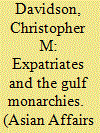

|
|
|
|
|
| Publication |
2014.
|
| Summary/Abstract |
For many years huge expatriate populations have played a much documented role in the economic development of the Gulf monarchies. But a less well-told story is how expatriates have also contributed to their political stability. As non-citizens their presence in such large numbers has reinforced the elite status of most citizens in the region - an important non-pecuniary legitimacy resource for the various ruling dynasties. Moreover, the primarily employment-driven status of expatriates has meant that they have usually adopted either an apolitical or even prostatus quo stance. In some cases their perceived loyalty has led to selective naturalization or even direct co-option into security services. Disrupting this decades-old relationship, however, have been the recently changing political and economic circumstances of the Gulf monarchies. Already decisions have been made to reduce significantly expatriate populations due to accumulating pressures. Such measures are likely to threaten the historic political advantages the presence of expatriates has provided for these polities.
|
|
|
|
|
|
|
|
|
|
|
|
|
|
|
|
| 5 |
ID:
132341
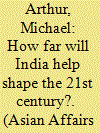

|
|
|
|
|
| Publication |
2014.
|
| Summary/Abstract |
In the wake of the BJP's crushing defeat of Congress in the national elections held in May 2014 the author assesses India's prospects and potential in the light of the oft-made comparison with China. India is famously diverse, the largest democracy in the world, with a relatively young population. India is secular, in the sense that state and religion are not linked, but at the same time India is a deeply spiritual society, diversely religious. In all these areas China's experience is wholly different, but not necessarily better, though in purely economic terms China is far ahead of India and Indian underperformance. Nonetheless, India is likely to be just as central to global issues like climate change, the Digital Revolution, public health and migration. In addition, managing all aspects of the relationship with Pakistan will be one of the key issues for 21st century security. In all this, while poverty, caste and appalling governance will hold India back, diversity, tolerance and an entrepreneurial culture should help her forward.
|
|
|
|
|
|
|
|
|
|
|
|
|
|
|
|
| 6 |
ID:
132347
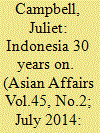

|
|
|
|
|
| Publication |
2014.
|
| Summary/Abstract |
An account of the 2013 tour to Indonesia which encompassed Jakarta, Central and Eastern Java, Sulawesi and Torajaland, as well as Bali. Beyond visits to world famous tourist sites like Borobodur, Prambanan and the island of Bali, the members of the tour party tried to come to an understanding of the diversity of modern Indonesia, its politics, its economic prospects and the role of Islam. The party had a number of meetings with prominent actors in modern Indonesia, the world's largest Muslim state. Economic prospects are promising and the Presidential elections in July 2014 and their result will give an indication of the country's likely trajectory.
|
|
|
|
|
|
|
|
|
|
|
|
|
|
|
|
| 7 |
ID:
132346
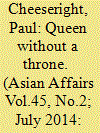

|
|
|
|
|
| Publication |
2014.
|
| Summary/Abstract |
The climax of the battle of Kohima was in June 1944, 70 years ago. This article is about the part played in that victory by Ursula Graham Bower, an English woman subsequently honoured by the RSAA. She led a team of Naga tribesmen from North East India who acted as intelligence scouts, feeding the 14th Army with information about the Japanese, acting as guides for British units and providing a security network against spies. Graham Bower was effective because she had lived amongst the Nagas before the war and gained their trust. Inevitably she was glamourised in the media and hailed as the Jungle Queen or the Naga Queen, a Western beauty fighting against the Japanese. In reality, with the Nagas, she performed a intelligence role, not a fighting role, but it was a vital contribution to victory.
|
|
|
|
|
|
|
|
|
|
|
|
|
|
|
|
| 8 |
ID:
132076
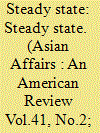

|
|
|
|
|
| Publication |
2014.
|
| Summary/Abstract |
Inherent to the United States' approach toward the Democratic People's Republic of Korea (DPRK) since the second North Korean nuclear issue emerged in the early fall of 2002 has been a policy predisposition that has coexisted with little tangible movement in the direction of resolving this very serious regional and global problem. Indeed, since its inception, overall this problem has become worse. That the DPRK has detonated three nuclear bombs hardly makes the security environment in Northeast Asia more stable, contrary to Pyongyang's claims that its nuclear deterrent force does just that, or brings the North Korean nuclear issue any closer to resolution. For sure, major missteps by Pyongyang have exacerbated the nuclear issue. Moreover, because the Bush and Obama administrations have maintained this predisposition embedded in U.S. ideology, which like any belief system, including the DPRK's juche (self reliance) idea, begets emotion accompanied by both self-deception and deception on the part of state officials, policies implemented by Washington in response to the North's perceived provocations have produced few successes. Policies built on faulty foundations, specifically those that exude the animus of the Cold War, are more likely to fail than not. This paper concludes by providing a practical solution to the North Korean nuclear issue, which should be attractive to both Washington and Pyongyang: a conditional peace treaty that rather quickly leads to the DPRK's denuclearization.
|
|
|
|
|
|
|
|
|
|
|
|
|
|
|
|
|
|
|
|
|